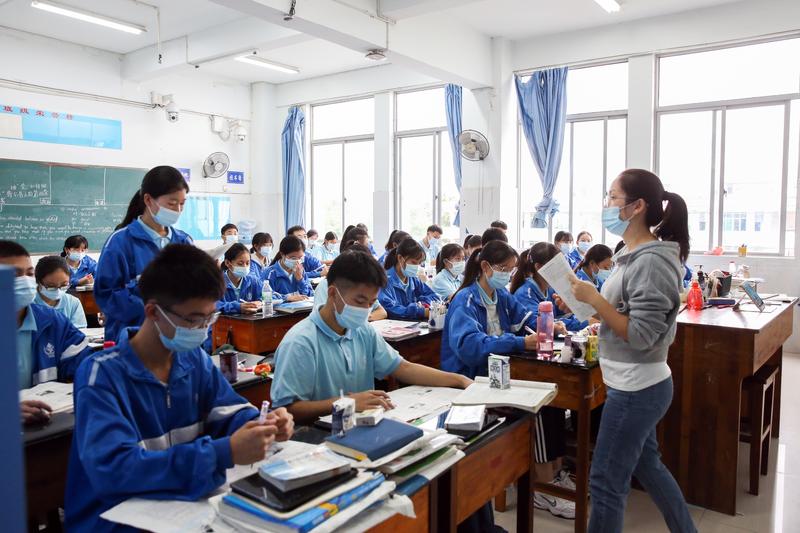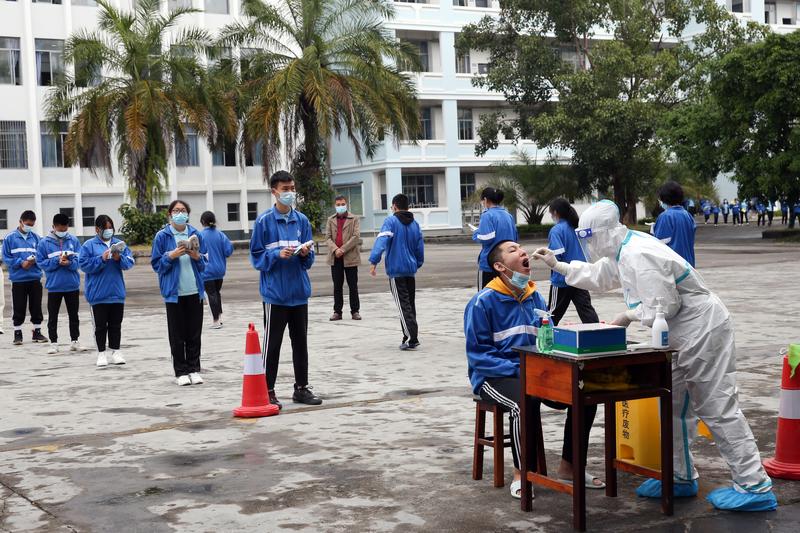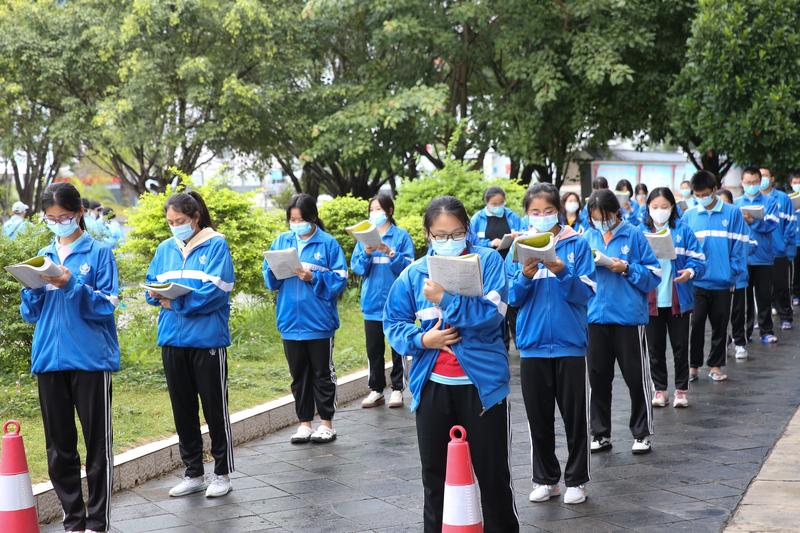Authorities have overcome a number of problems to ensure that regular classes can resume despite outbreaks. Wang Xiaoyu reports from Ruili, Yunnan.
 Students wear face masks during a class at Ruili No 1 Junior High School in Yunnan province on Nov 13. (WU XIAOHUI / CHINA DAILY)
Students wear face masks during a class at Ruili No 1 Junior High School in Yunnan province on Nov 13. (WU XIAOHUI / CHINA DAILY)
When Geng Limeng, a 17-year-old in Ruili, Yunnan province, heard from her teacher on a September morning that regular offline classes would soon resume, she said she wanted to "fly back to the classroom immediately".
In the past year, her on-campus life at Ruili First Minzu High School has been overshadowed and interrupted by many cases of COVID-19 as the border city deals with the rising risk of infections that have been identified as originating in neighboring Myanmar.
Our interviews with parents have shown that about 80 percent of them would prefer to send their children to school if the virus situation allows and safety precautions are in place
Li Qian, vice-mayor of Ruili
On Sept 15, Geng finally returned to school and was reunited with her classmates. "We were so excited that we just kept talking and chattering until 1 am the next day," she said, referring to the fact that the children are now boarding at the school.
According to the local government, 5,200 students at eight schools across Ruili had returned to campus as of Nov 12. The figure comprised 2,540 senior high school students and 2,660 junior high school students.
Ruili, bounded by Myanmar on three sides, is situated on a border that stretches almost 170 kilometers and has few natural barriers.
Amid the tough and protracted battle against the outbreak, Geng, like all the 1,100-plus high school seniors in Ruili, also faces the pressure of taking the gaokao, the all-important national college entrance exam, next summer.
The most recent cases in local communities were first detected on July 4. After that, all the schools in Ruili moved classes online until mid-September.
"I was not very self-disciplined while taking online classes at home and alone," Geng said. "Sometimes, I felt inadequate and very anxious."
A few years ago, she visited Shanghai and was instantly enamored with the city's vibrancy and metropolitan atmosphere. In response, she set herself the goal of enrolling for a law major at Shanghai University.
"I was worried that I might miss the opportunity to attend my dream college, and I feared that I would not meet my parents' expectations," she said.
 Children line up to have nucleic acid tests. (WU XIAOHUI / CHINA DAILY)
Children line up to have nucleic acid tests. (WU XIAOHUI / CHINA DAILY)
Necessary precautions
Li Qian, Ruili's vice-mayor, said local authorities have been using all means possible to resume in-person classes, while ensuring the students' safety.
"Our interviews with parents have shown that about 80 percent of them would prefer to send their children to school if the virus situation allows and safety precautions are in place," she said.
After the outbreaks had largely been brought under control, health experts and local authorities reached a consensus that despite the risk of sporadic infections, it was feasible and safe to reopen the city's schools.
However, necessary precautions had to be taken to shield students and faculty members from the risk of the virus spreading, including restricting general entry and exit to schools and conducting regular nucleic acid tests.
Liu Yan, principal of Ruili First Minzu High School, said upgrading the infrastructure to provide accommodations for students and faculty members was the first step that had to be taken.
"About one-third of students at the high school used to live away from the campus, so there was not adequate space for them to take naps and sleep at night," she said.
 Students read while waiting to undergo the tests. (WU XIAOHUI / CHINA DAILY)
Students read while waiting to undergo the tests. (WU XIAOHUI / CHINA DAILY)
Under the guidance of local education authorities, the school has transformed empty classrooms into dormitories, each designed to house 15 to 20 students.
The city government also purchased about 2,870 sets of bunk beds from Kunming, the provincial capital, and about 700 of them were sent to Ruili First Minzu High School.
However, the more complicated challenge is to comfort and care for students distressed by academic pressures, being separated from their families and the new routines of dorm life.
Li Lanyi, who teaches Chinese at the school, said communication is the key.
"In the past, the relationship between teachers and students was confined to the academic setting. Now, because of prolonged periods of staying together on campus, I am able to see the students in a different light and offer help and advice at all times," she said.
"I always tell them that life is never a smooth ride, and it is perfectly normal to have negative feelings and ask for a break," she added, noting that on-campus teachers and doctors are always on standby to provide advice.
Ming Zonglong, a school administrator, said that to ease tensions among both students and parents-some of whom still have doubts about whether their children will adapt to the new environment-teachers use digital devices to live-stream and record a weekly session in which the students share their feelings and anecdotes.
Virus-free environment
"The strict regulations are meant to safeguard the health of the children, as well as staff members on campus," Ming said.
"After a few weeks of adjustment, I think that we-parents, teachers and students-all agree that these measures are necessary to guarantee that the school will be a safe, virus-free place."
Two people have been assigned to conduct campuswide nucleic acid tests two or three times a week.
Each student has been assigned a digital code, so it only takes three hours to collect throat-swab specimens from the 800-plus people on the campus.
Geng always consults her English textbook while she waits in line on the playground to be tested.
"There are so many new words and phrases," she said. "I need to seize every minute."
She added that she often draws strength from a line her Chinese language teacher, Luo Ruyi, quoted in class.
"She told us that if we are not at liberty to ride on a calm expanse of ocean, we can always choose to sing against the tempest," Geng said.
She added that the pandemic raging across the world is akin to a devastating storm that everyone is bravely resisting.
While the risk of the virus has not been entirely stamped out in Ruili, the school is providing a safe haven for its students.
"I am accustomed to living on the campus now," Geng said. "We (children) are still striving to realize our dreams."
Contact the writer at wangxiaoyu@chinadaily.com.cn


